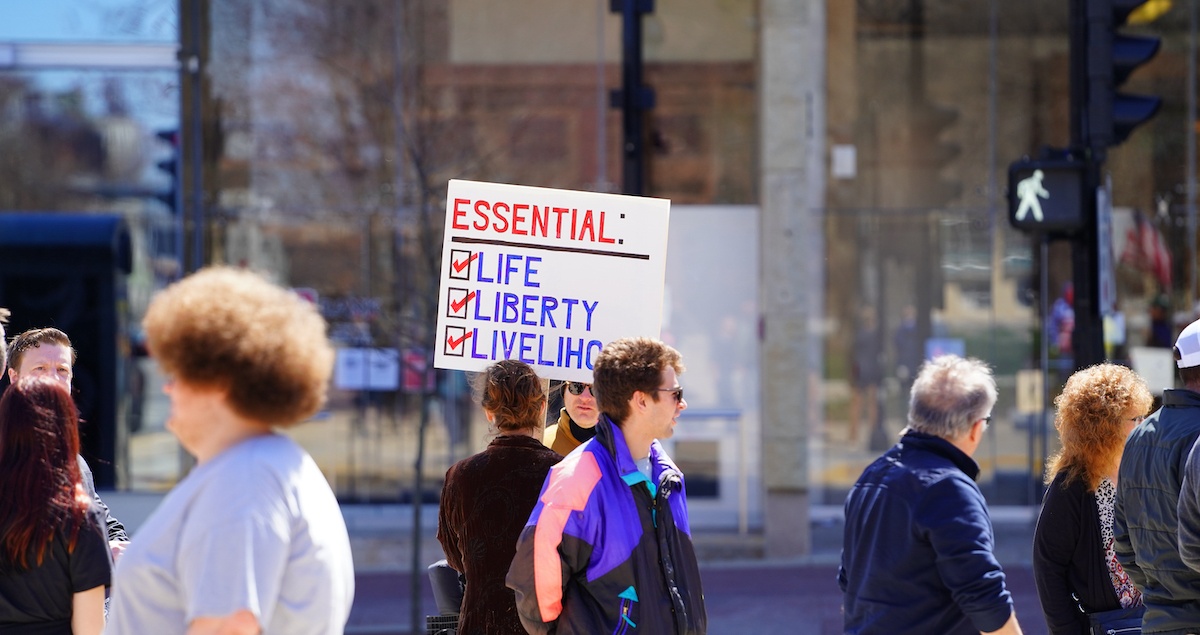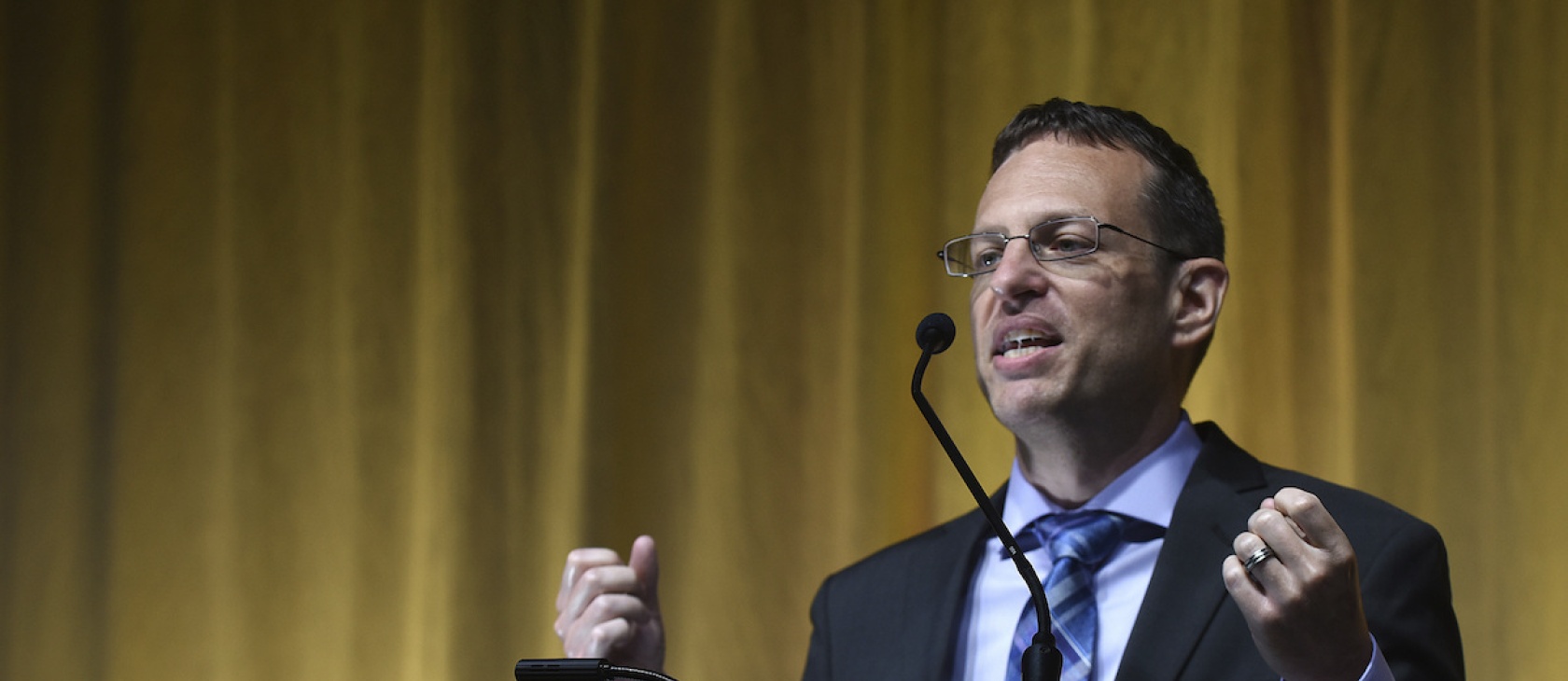For many years, libertarians and economic conservatives lived in harmony. The philosophy of fusionism said that the conservative party, when it governed, would seek to promote social traditions and economic liberties—each reinforcing the other. In recent years, however, this fusion has started to dissolve. Today many conservatives, especially those termed the New Right or the post-liberals, accuse libertarians of having no answer when economic entities use their freedom against social traditions. Libertarians, in turn, are concerned that conservatives want to impose their vision of morality on everyone. Is any continuing alliance between the two factions possible? If not, what does that mean for the future of politics?
I should start by defining what I mean by “libertarian.” A libertarian is basically someone for whom liberty must be the highest political principle. However, there are various types of libertarians.
With the rise of an illiberal New Right and the identity-politics-obsessed left, libertarians are having a hard time of it. Can they find a party to go to or must they stay home until a new era of liberty emerges?
Some, generally known as civil libertarians, believe that equality and liberty are inextricably linked and therefore support the use of the law to promote equality. They have long been at odds with conservatives, believing that traditional societies coerce some people on grounds of race, gender, or sexual orientation, and therefore have long been associated with egalitarians of other political stripes. For that reason, I’ll call them “left liberals” when I come back to them.
Others, who for want of a better phrase I shall call antiwar libertarians, regard the military component of what President Dwight Eisenhower called the military-industrial complex as offensive to liberty. Most associated with abolishing the draft (which Milton Friedman campaigned for in the 1960s), they are also strong opponents of nation-building and foreign intervention. They favor free trade and oppose sanctions but made common cause with anticommunists during the Cold War. Many of them grew disillusioned with the conservative movement over the Iraq War, but so did many social conservatives. In any event, the collapse of neoconservatism after that war meant they had little to be concerned about going forward. All told, this probably is not a significant part of the libertarian movement at the moment, but many libertarians still identify with it.
A third group, and in recent years the largest part of the libertarian movement, consists of economic libertarians. Their views have generally been accepted by conservatives when it comes to the economy, but the reason why speaks in large part to why that alliance has been so close.
As I intimated earlier, libertarianism is a political belief. It is not a system of ethics. At heart, it is a neo-Aristotelian philosophy that seeks to build a bridge between what is good for individuals, for the communities of which they are part, and for the society where those individuals and communities operate.
Aristotle’s central question was, What is a good life? The answer for Aristotle and libertarians is “human flourishing” or, as Thomas Jefferson put it, the pursuit of happiness. Yet what makes one person flourish or achieve happiness may not necessarily have the same effect for another. One woman will find peace in a garden, while another will tear down that garden to create a magnificent building. Legislating for everyone to keep their property in a state of nature or for everyone to work their land to create new things would both be equally pointless from the viewpoint of human flourishing. In fact, the only thing that connects these different human approaches to flourishing is that they are self-directed. Indeed, as legal scholar Randy Barnett and philosopher Doug Rasmussen put it, “Self-direction is the central necessary constituent or ingredient of human flourishing without which no other feature could be a constituent.” But, turning back to Aristotle, man is by nature a political animal. Which means that a political system aimed at the good life must have self-direction at its core.
This is what Rasmussen and his collaborators call “liberalism’s problem”—how do we establish a political order that does not give preference to any one person’s or community’s perceived well-being over any other’s? The way to do that is to give preference to natural rights, which taken together form the principles of liberty. Rights such as the right to property, freedom of association and contract, and self-defense come together to allow self-direction and thereby form the institutions of liberty. Cementing these in a political order creates other institutions, such as the rule of law, that allow us to address grievances created when rights conflict. Does the man who delights in building edifices have a right to cut off access to sunlight to his neighbor’s garden, for instance? The right of first possession says yes if he was there first, no if he was there second, and the rule of law enforces this right, providing restitution to his gardening neighbor whose plants have died.
Many of these rights come together to create the economic system we call free enterprise, which has vastly increased the capacity for human flourishing. Indeed, the egalitarian aspects of liberalism I alluded to above helped create the conditions for what economic historian Deirdre McCloskey calls “bourgeois dignity,” whereby the merchant is viewed not as a parasite but as a wealth creator to be celebrated. This shift in attitudes toward entrepreneurial activity, which occurred first in the nations around the North Sea in the 17th and 18th centuries and spread to their subsequent colonies, is responsible for the vast explosion in wealth in those societies and their descendants, most notably the United States of America. McCloskey calls this phenomenon “The Great Enrichment.” One way in which free enterprise evolved was by extending these natural rights to the associations of individuals and investors we call corporations.
What is interesting is that until recently such a description of the basis of society and the importance of its institutions would have been viewed as firmly conservative beliefs. Indeed, I suspect many readers of this journal would agree that they still are, yet we see a growing number of conservative political and thought leaders rejecting the implications of some natural rights in the economic sphere and proposing policies that conflict with them.
One area where this is most apparent is what we call Big Tech. Conservatives rightly value, as do libertarians, the natural right of free speech. In the view of many conservatives, however, large technology companies have deprived them of this right by banning the use of certain terms that until recently were considered acceptable, adding “fact checks” to their expressions of opinion, and in being heavy-handed in banning speech related to medical opinions during the pandemic. They have a point. Technology companies have been heavy-handed, all right, and have jumped the gun too often, especially on medical issues (such as the “lab leak” hypothesis about the origins of the COVID-19 virus).
However, other natural rights are in play here. The companies own their property, despite allowing people to use them for free—though we actually do pay, in terms of our attention and exposure to advertising. They also have a right to free expression, so they are within their rights to add “fact checks,” however wrongheaded some of them may be (the “fact checking” of satirical articles published by, say, The Babylon Bee is a case in point). They have a right to free association, so they can ban people they believe are abusing their property. All these are natural rights that conservatives have supported for a very long time.

Moreover, the legal system has not been terribly sympathetic to conservatives’ grievances over their perceived loss of rights. For instance, some conservatives now propose using antitrust law to discipline Big Tech companies by breaking them up into smaller entities that presumably will be friendlier to their customers’ speech rights. Yet antitrust courts take consumer welfare seriously and are unlikely to view the complaints of an outspoken minority as necessitating such an abnegation of property rights. So, many of those same conservatives have joined with progressives in Congress, who have their own gripes against Silicon Valley, to move to change antitrust law, giving bureaucrats the power to override property rights and other corporate rights. It’s illiberal and, until very recently, would have been regarded as unconservative.
Libertarians, of course, have objected. For the most part, conservatives have reacted with anger or disdain. Libertarians are derided as “not getting it” or, worse, complicit in a progressive assault on free speech. Writers on conservative websites and from such places as the Claremont Institute have attacked libertarianism as a cancer in the conservative body, demanding it be expunged. Increasingly common is the view that conservatives must advance a “post-liberal” society. The most extreme of the New Right, the self-styled “integralists,” regard libertarians as just a form of progressive and suggest a reordering of society along one particular conception of the good life, which they term “common good conservatism.”
The speech and technology issue is just one of many that are causing friction between libertarians of various stripes and their erstwhile conservative allies. Conservative politicians are now urging new laws to force workers to sit on company boards, a clear violation of the rights to property and of free association. We are in a new era of protectionism, where free trade is sacrificed to prop up favored American industries. Immigration has become a dirty word. Proposals to ban certain activities that have long been viewed as constitutionally protected free expression are rife. Everywhere you look, the fusionist alliance is under severe strain.
What happened to turn so many conservatives against these natural rights? Some libertarians blame President Trump and his MAGA movement. That is a tempting explanation, but mistaken. If you look around the world, similar things are happening to conservatives all over. Boris Johnson’s Conservative Party is now the U.K.’s party of higher taxes, more government spending, intervention in the economy, and COVID restrictions. The old conservative parties in France and other European countries are in the process of being wiped out and replaced by something else (the same has happened to social democrats). The conservative Liberal Party government in Australia has been the most heavy-handed in any major developed country when it comes to COVID restrictions, even placing asymptomatic carriers in camps.
This is because politics around the world has undergone a significant realignment. For the past 80 or so years, political parties aligned around economics as the primary issue. You were either for free enterprise or for state direction. A secondary axis was social politics, which, when combined with the economic axis, led to the famous four-quadrant Nolan chart that segmented the politically aware into liberal (or progressive), libertarian, conservative, and authoritarian blocks.
Such neat categorizations no longer apply. What appears to have replaced economics as the primary aligning issue is identity. Conservatives around the world no longer center themselves in the economics of free enterprise, as Margaret Thatcher, Ronald Reagan, John Howard, and so many others did, but on their national identity. Boris Johnson championed Brexit, while President Trump proclaimed loudly that he stood for the American worker. This, noticeably, attracted large numbers of former supporters of opposing parties. The historian Éric Zemmour has come from nowhere to be a leading contender for the presidency of France by championing a robust French national identity. Leaders in Eastern Europe like Viktor Orbán are proudly nationalist.
This has affected the left, too. The Danish Social Democrats and other Nordic leftist parties have become very tough on immigration and trade. In America, however, the left has organized around identity—race, gender, sexual orientation, and a multitude of minority identitarian groupings (e.g., Black Hispanic transwoman) that derive from intersectional theory, which asserts that individuals are often put at a disadvantage by more than one source of oppression. As the primary political issue, it is driving things like education policy, which is why school board meetings, which progressives often control, have gone from being forums to decide where to spend money to contentious affairs concerning a host of such issues.
The ramifications of this realignment are both profound and far-reaching. Most notably for our current consideration is that it leaves both old-style liberals and libertarians without a political home. Both varieties of liberal are generally pluralistic and cosmopolitan, meaning that they oppose both nationalism and identitarianism.
Another, perhaps underappreciated, aspect of the realignment is the self-consciously Christian identity of many American nationalists. A lot of attention has been paid to the Catholic “integralism” of scholars like Adrian Vermeule, but Catholicism remains a minority denomination among American Christians. The Dispatch writer David French, a former conservative darling before the realignment, has drawn attention to the—literally—apocalyptic nature of the new American Christian right, particularly among Pentecostals. He writes: “MAGA Christian nationalism is emotional and spiritual, not intellectual or ideological … is concentrated in the churches most removed from elite American culture, including from elite Evangelicalism … [and is] often rooted in purported prophecies.”
Libertarians are strongly in favor of the separation of church and state, although they may worry that the free exercise clause of the Constitution has been devalued by the courts. The idea that American politics might be driven to some degree by a prophetic movement flat out scares them.
All of which suggests that libertarians have been driven out of a MAGA-focused right. Yet that may be a step too far, at least for now. They clearly have no home in an identarian-dominated left, either. Free traders who expressed support for President Biden have been ignored as the administration has doubled down on protectionist trade policies. As much as the attacks on Big Tech have increased on the right, progressives are even more enthusiastic about antitrust as a solution to every economic ill you can think of. Senator Elizabeth Warren has even suggested using it to fight inflation, on the crackpot conspiracy theory that American grocery stores have formed a de facto cartel aimed at squeezing more money out of American households.
Moreover, the identitarian left routinely decries capitalism as the product and continuing enforcer of structural racism. This accounts for the modern form of socialism being less focused on economics than previous versions. Socialism is needed not because of class conflict but because capitalism supports racism—as exemplified by The New York Times’ ahistorical 1619 Project, which contends that capitalism and slavery are inextricably linked, and unfounded attacks on free market economists like Nobel Prize winner James Buchanan for supporting color-blind policies that leftists deride as racist.
America has a two-party system. For libertarians to have any political influence, they have to ally with the dominant faction of one of the parties. That suggests that libertarians will have to settle for a diminished role on the right. It is important to remember that the Trump administration did adopt some libertarian-influenced policies, though not consistently and certainly not in all areas. It adopted a pro-energy stance and withdrew from the ruinously costly Paris Climate Treaty. It was mostly opposed to big labor and employment regulations. It was especially free market in its transportation policies. Appointments to nonexecutive agencies like Ajit Pai at the Federal Communications Commission and “cryptomom” Hester Peirce at the Securities and Exchange Commission drew predominantly from a base of scholars steeped in free enterprise economics. So reports of libertarianism’s demise may be exaggerated.
However, as identity issues come to bear in more and more areas—progressives, for instance, are looking to manipulate financial regulation to impose restrictions on industries like fossil fuels—the New Right will probably be inclined to use the power of government over the objections of libertarians concerned about natural rights.
In which case another opportunity might present itself. Remember those left-liberals and anti-war libertarians I mentioned earlier? They are increasingly out of place on the left. These old liberals are concerned about the rate and extent of woke politics coming to drive out all other considerations. This may have manifested itself in the recent recallof three “woke” members of the San Francisco School Board. Conservatives played no role in this. Moreover, capitalism has been very good to the political left’s donor class, which must surely view its rapid slide toward identity-focused socialism as a cause for concern.
With that in mind, it’s worth asking: Is it possible that left-liberals and economic libertarians might recombine in a new political block? For that to happen would require a decisive defeat of either woke socialism or nationalist conservatism. Either looks unlikely at present, but shifts within parties have happened before. The chances are small but cannot be completely discounted.
However, what is more likely is that libertarians will continue their alliance with conservatives. As economic ills caused by interventionist policies start to appear, libertarians will be well situated to point to free market policies to right the ship. The influence of the liberty-centered law and economics school on the judiciary will also continue, particularly on the Supreme Court. For instance, for the first time since the 1930s, the constitutionality of unaccountable nonexecutive agencies is in question.
Far from retreating to the offices of Reason, Cato, or the Competitive Enterprise Institute until the whole thing is over, libertarians are likely to continue to fight for the system of natural liberty and make their case to their conservative colleagues. In some areas, like trade, this will be difficult. However, libertarians have gone through periods of far less political influence in the past. I often think of Leonard Read, founder of the Foundation for Economic Education, or Pierre Goodrich, founder of Liberty Fund, and how lonely they must have felt in the post–New Deal era. Libertarians are not as lonely now and have a history of having been proved right that dates back all the way to Aristotle. That’s something conservatives should appreciate.




